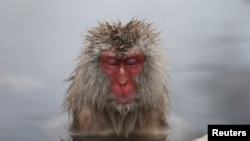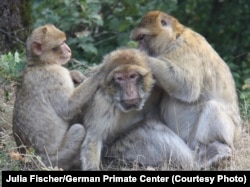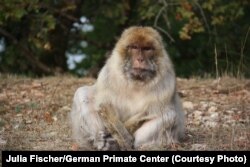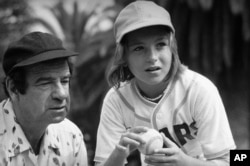The grumpy old man who yells “Get off my lawn!” at anyone who comes near is a funny stereotype. But it's based in reality - many people do get more prickly as they age. Psychologists attribute that social selectivity to a recognition that time is growing too short to waste it on people we don’t like. But our desire to hang out less and narrow our social interests may have deeper roots.
Scientists studying Barbary macaques at the La Forêt des Singes Park in Rocamadour, France noted that older monkeys tended to be pickier about who they interacted with but were still interested in the social information around them.
Since it’s likely that monkeys are not aware of their limited life spans, scientists believe that decreases in social interactions may be an innate trait of all primates.
Social networks
In this study, published in Cell, Julia Fischer, head of the Cognitive Ethology Laboratory at the German Primate Center, and her team observed over 100 Barbary macaques during social interactions. They supplemented their observations with experiments that tested the monkey’s interest in new toys and in social information about their friends.
First, the expected finding. The monkey’s interest in exploring new things decreased quickly with age, less so if food was involved. This is attributed to a loss of fine motor skills as the monkeys got older.
Now for the unexpected. Grooming is a prolific method of social interaction in monkey groups. It reduces stress and helps the monkeys form alliances with one another. As the Barbary macaques aged, they became much more selective in who they groomed, but they were still groomed by younger monkeys.
“Some people look at relationships of monkeys just in terms of tit for tat,” Fischer told VOA. “If I groom you, you have to provide me some support in a future fight. This grooming of these old ladies and old monkey gents means that [younger monkeys] are still attached to them [older monkeys] although they provide no benefits.”
Even more remarkable was how the older monkeys handled social information - simian gossip, as it were. Who is having babies? Who is fighting with who? To simulate these tidbits, researchers played recordings of screams from older monkeys’ friends, as well as strangers. They also showed the older monkeys pictures of baby macaques, which hold a special status in their society. What surprised researchers was that both male and female monkeys continued to show interest in both the pictures of babies and the screams of their friends. “If somebody in their group is having a fight they’re still commenting … as if they were taking part in it emotionally,” explains Fischer.
So while their social interactions became more focused, the older monkeys were still aware of the social goings on of their group.
Macaques and humans
You may find it odd that scientists are studying Barbary macaques to understand human behavior. They’re not as closely related to us as, say, chimpanzees but that’s actually the point. Macaques and other monkeys have similar social structures to humans. For example, we interact with people across generations and often live in communities with mixed ages. Studying these monkeys “allows you to isolate a particular aspect of human behavior … that you are interested in and then you … use your magnifying lens to focus on that aspect”, says Dario Maestripieri, who studies the evolution of behavior in both humans and non-human primates. If these traits are present in both humans and monkeys, it reveals they are more deeply rooted in our behavior.
Psychologists have long accepted that the decrease in social activity of humans is due to a recognition of mortality. But having this trait show up in monkeys flips the script. Instead of humans thinking their time is short so they have to make the best of it, maybe they start limiting their social interactions first and then reason later that it’s because they’re aging. Which would imply that this behavior was preferentially selected for in our primate ancestors.
Human aging researchers are praising the study but aren’t convinced of the evolutionary implications.
“Evolutionary selection works primarily on critters of childbearing age. So when you’re looking at behavior in late life, it is very difficult to tie that up to evolutionary selection,” Carolyn Aldwin, Director of the Center for Human Aging Research at Oregon State University, told VOA in an email, adding, “The much more reasonable explanation is … energy. As you age, you have less energy.”
Susan Charles, a professor of Psychology and Social Behavior at the University of California at Irvine, says the findings don’t negate the influence of a feeling of mortality on seniors’ decreased social activity. However, she says, the results show there may be other deeply-rooted influences on the behavior that warrant further study.
This research also raises questions for Fischer about why older monkeys are still interested in social information but not in acting on it. This trait, however, is also observed in aging humans, says Aldwin. “People who are engaged in social networks are actually more likely to live longer. So it makes perfect sense to me that people … and monkeys would … do that.”
It seems that aging is more like “Get off my lawn, but go stand on the sidewalk so I can still hear the gossip.”







